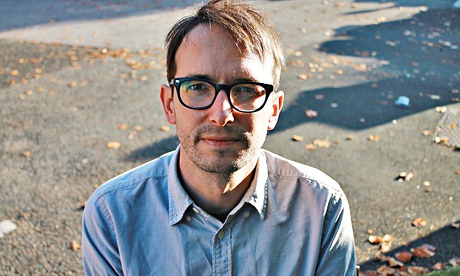
Chris Killen’s second novel is a triangular love story set at a time when the internet is always with you – at once offering to play Cupid, and wreak havoc. If you’ve read Killen’s strange and sparky first novel, The Bird Room, his followup is going to surprise you. Where the 2007 debut was a surreal “hall of mirrors” with identities as slippery as banana skins, In Real Life plays an altogether different game.
It tells, in braided chapters, the story of three friends from university: Lauren, Ian and Paul. We first meet indecisive only child Lauren in 2004, as she weighs up whether to leave her wannabe writer boyfriend Paul (the reasons in favour are many, including his pretentiousness, bitterness and bad breath). She does leave, and escapes on a trust-funded trip to Canada, where she begins exchanging emails with Paul’s former housemate Ian. In sweet contrast, Ian is thoughtful, self-deprecating and plays in an NME-tipped band. So far, so good …
Cut to 2014, and the friends have fallen out of touch. Paul has released a novel, the brilliantly awful-sounding Human Animus, and is working – in full embrace of the cliche – as a creative-writing teacher, eaten up by violent jealousy of Jonathan Franzen and an equally violent crush on a tattooed student. Poverty has forced Ian to pawn his beloved guitar and move in with his twin sister, and Lauren is working in a charity shop. The narrative slides back and forth across the decade but stays principally in the present day, with most of the mid-noughties conjured through Lauren and Ian’s 2004 Hotmail exchanges. (Emails in novels – always set apart in sans serif – can jar, but Killen’s are lovely; perfectly capturing the simultaneous sweetness and acute embarrassment of those old versions of ourselves that linger at the base of our inboxes.)
In Real Life – the expanded form of the internet abbreviation IRL – is a great title, and the intrinsic tension in the phrase works hard for the book. Killen’s metaphors rope in cartoons, indie films, TV dramas and adverts to describe reality. His palette is digital; the world is only understood by what’s seen on the screen. And yet, although Amazon, eBay, Facebook and funny dog videos all get a mention, and the main pulses of the narrative depend on technology, Killen remains skilfully unpushy with the theme. The digital age is pervasive, but in the most prosaic sense. This is a world where soulless telesales offices have notices that say “No vaping”, where @ signs sneak their way into bar names (“Vodka L@goon”), and where kindness is someone who doesn’t encrypt their Wi-Fi connection.
Ultimately, it’s the un-glamour of the internet, and the un-romance of real real life, that Killen is interested in showing. After all, when the title gets its name check – “Look, she forced herself to think, real life!” – it refers to discovering a clump of grey hairs on a lover’s temple.
Understandably then, In Real Life is no adventure story. But the prose is neat, the pages fly by and, if the language is not always stirring, there are lines that shine out. Jetlag, for example, “feels like being injected with soup”; the word cancer delivers a “one-two gut punch”. Overall, sitting down with the novel recalls an evening in a pub with someone you’re not hugely close to, but you like – there are silences and slow points, but it’s enjoyable. Because what In Real Life has, in bucketfuls, is heart. The characters – particularly feckless, forlorn Ian – are full of feeling. And this emotional sincerity represents a refreshing change from the many novels by and about young people that are knee-deep in irony.
Towards the final pages, the story spills over into 2015. Fate in the form of a mutual friend’s wedding pushes Lauren, Ian and Paul into the same room again, and both the rom and com elements of the novel are, as you might expect, ramped up. It’s this fulfilment of expectations that makes In Real Life so dissimilar to The Bird Room. Perhaps Killen felt pressure to write a more likable, accessible second novel; perhaps he is demonstrating his vocal range and versatility as a writer. Either way, it’ll be interesting to see what he gives us next.
• Rosa Rankin-Gee’s The Last Kings of Sark is published by Virago. To order In Real Life for £9.99 go to bookshop.theguardian.com or call 0330 333 6846.

